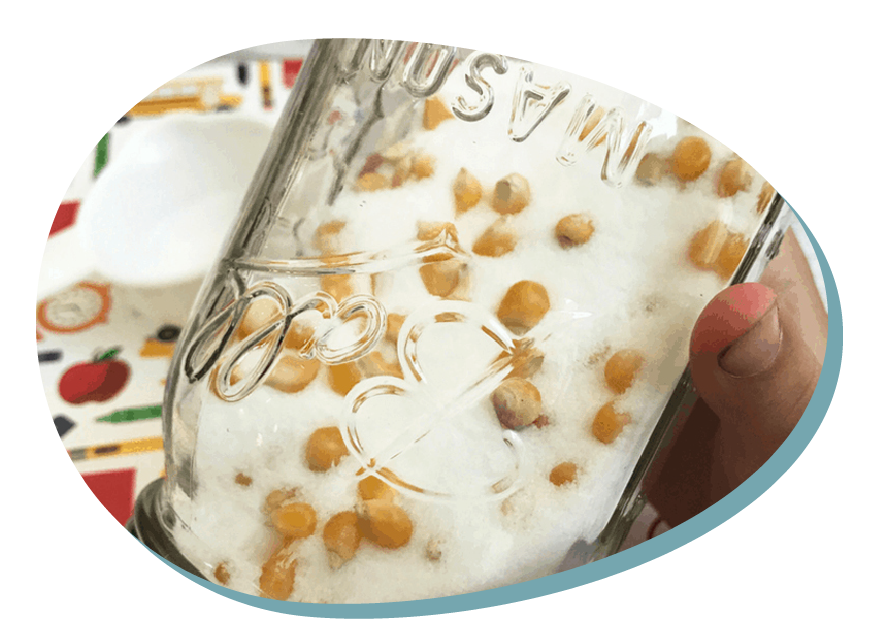Popcorn and salt science experiment
Type of resource: Blog, guidelines
Web address https://awefilledhomemaker.com/popcorn-salt-science-experiment/
Language: English
Description
Experiment with salt and popcorn to see if they stay mixed or if they separate.
Scientific concept introduced
Density of solid objects.
Creative and critical thinking
To think about what other ingredients could be mixed with the kernels in the same jar and what could happen to them.
Mathematical reasoning
To be precise with the measurements.
To develop the ability to observe and discover.
Scientific thinking
To ask questions.
To analyze what is happening inside the jar. To conduct a research (thinking about what will happen with the salt and the kernels).
Learning how to learn
To develop their motivation to learn and engage with the activities.
Additional
Use of hand-eye coordination.
Sharing ideas with other classmates.
To follow the instructions.
Popcorn and salt science experiment
Overall aims
To develop the ability to observe and discover
To strengthen the research attitude of children.
To improve children’s problem-solving (take initiative).
To develop the opportunity to do science with their hands.
To create the learning opportunity for explaining the concepts of heterogeneus mixture, physical transformation and heat.
To improve their active listening (read aloud of the story)
Vocabulary – keywords should be understood
Popcorn, salt, heterogeneous mixture, physical transformation, heat.
Other vocabulary: Carbohydrates, nutrition.
Expected learning outcomes (operational aims)
To run the scientifically experiment.
To make popcorn technically easy.
To make a heterogeneous mixture (salt and popcorn mix together).
To explain the concept of heterogeneous mixture, physical transformation…
To measure or calculate the time of physical transformation.
STEM skills – to which the learning unit is related to
CORE STEM SKILLS
● Asking questions.
● Analysing and solving problems.
● Designing experiments.
● Drawing conclusions based on results.
● Designing alternatives to heating the popcorn and drawing conclusions about how is the better.
● Motivation to learn and engage.
● Self-discipline and self-regulated learning (cognitive autonomy).
ADDITIONAL SKILLS
● Sharing ideas
● Hand-eye coordination
● Taking common decisions
● Basic literacy – listening with comprehension and use of refrain (play with the phonetic sounds).
Teaching methodologies/activity outline
1- Read aloud the Popcorn and salt website and see the video.
2- Ask questions such as- How could we make popcorn in our home or school with the materials that we have?
3- Give them time to experiment
Give the salt & popcorn kernels into the jar and seal with the lid.
Mix together the salt and the popcorn kernels.
4-Create some questions to consider asking for this popcorn & salt science
experiment (in the website there are some of it):
● Did the experiment end up how they thought it would?
● How close was their initial hypothesis to the actual results?
● What would they change about the experiment if they could to get a different
outcome?
(From the website: https://awefilledhomemaker.com/popcorn-salt-science-experiment/)
5-Build the design to end of the experiment
6-Experiment
In the website only describes the way to do the mixt to popcorn and salt, but for finish the experiment heating is required. It is possible heating with microwave, oven or steam cooker.
7- Make the popcorn and salt with someone of the different possibilities to heating.
8- Enjoy with your popcorn!
Assessment of learning
Initial evaluation
– Get to know the previous knowledge they could know about the same theme.
Continued evaluation
– Progressively acquire basic habits of autonomy in everyday actions, to act safely and effectively.
– Think, create, elaborate explanations and start the basic physical skills.
– Observe and explore the immediate, natural and physical environment, with an attitude of curiosity and respect and gradually participate in social and cultural activities.
– Participate cocking the popocorn, through movement, assimilating sensations related to space and to the time and with a progressive understanding of the necessity of some norms.
– Use the oral language, gesture and images to express ideas, desires, feelings and emotions; Listen and participate actively in regular situations.
Conversation and learning with the use of non-discriminatory language, and with attitude of respect towards other cultures and different languages.
– Manifesting the necessary abilities to be able to listen, observe, interpret and create in the different languages: verbal, body, plastic, and audiovisual, and incorporate the introduction to technological instruments (ICT).
Final evaluation
– To evaluate the learning objectives, use the chart in which the more important
elements will be highlighted.
Equipment and materials to be used in learning unit (tools, ingredients etc)
● 16 oz glass jar and lid
● 1 C. table salt
● 1/4 C. popcorn kernels
Kind of setting
Lab or Kitchen
References – source
https://awefilledhomemaker.com/popcorn-salt-science-experiment/
Popcorn and salt science experiment
1. Usefulness for STEM education – integrating content of different disciplines
Cross-curricular character of the resource

The range of S-T-E-M subjects included

The presentation of possibilities of including artistic activities (STEAM approach)

2. Expected learning outcomes
Consistency (links) with preschool core curriculum

Communicativeness of description

3. Methodology of teaching
Clarity, communicativeness of instructions for teachers

Meaningful learning – using practical life problems

Original idea

The level of ease in implementing the methodology to preschool age children

The level of ease in preparing necessary ingredients, materials and equipment needed

4. Sustainability
Ecological characteristics of materials/ results

Supporting healthy eating habits

Relation with local traditions of cooking (using local products)

Low ecological footprint

Possibilities of inclusion (respecting cultural diversity and food intolerances)

5. Class management
Using differentiated forms of work – individual, team work etc.

Individual work

Team work

Whole group
6. Time management

Short activity (10-15 minutes)

Medium activity (20-30 minutes)

Long activity (1 hour or more)

Very long activity (1 day or more)
PDF: https://www.printfriendly.com/p/g/5TRhpr

